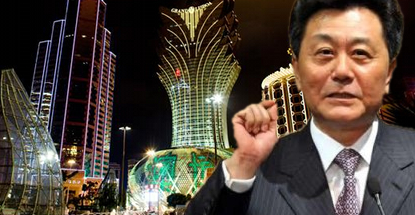 Macau’s VIP gamblers aren’t being paranoid, Beijing really is watching them like a hawk.
Macau’s VIP gamblers aren’t being paranoid, Beijing really is watching them like a hawk.
Li Gang (pictured), director of Beijing’s liaison office in Macau, told the Beijing News that China’s crackdown on corruption had left public officials with no doubt that if they travel to Macau to gamble, “they will be discovered.” Li boasted that any public officials with even a hint of naughty conduct on their records “now dare not go to Macau to gamble.”
Without getting into specifics, Li said Beijing had put measures in place to ensure that no public official gets in or out of a Macau casino without being identified. Among these measures are identify checks that are now conducted for anyone wishing to gain access to a casino VIP table.
Such measures may be responsible for the reported revival by some Macau casino operators of proxy betting, in which a junket operator representative sits at the gaming table and relays play-by-play card information to a VIP on the mainland, who then advises the proxy how much to wager on any given hand.
Li also urged Macau to work out a deal with Beijing that would allow China to repatriate corrupt officials who flee the mainland. The South China Morning Post has previously reported that such an extradition treaty was in the works between Macau and China’s other special administrative region Hong Kong. Li said Macau needs to strike a similar bargain with Beijing so that “once any criminal fled to Macau with money, the Macau authorities could repatriate [him], so as to jointly crack down on crimes.”
Last week, Li told Macau deputies to the National People’s Congress (NPC) in Beijing that Macau’s ongoing revenue slump wasn’t solely the result of the corruption crackdown but because “some of the casinos are not performing their promises to diversify their business and provide more services for retailing, conferencing and exhibitions.”
Li went on to say that Macau should take “full advantage” of the casino concession renewal process scheduled to commence in 2020 to “change the wait-and-see stance the industry takes.” Li qualified his statement by saying Macau’s diversification was a long-term project that could take three decades. But that doesn’t mean operators shouldn’t get started now.
